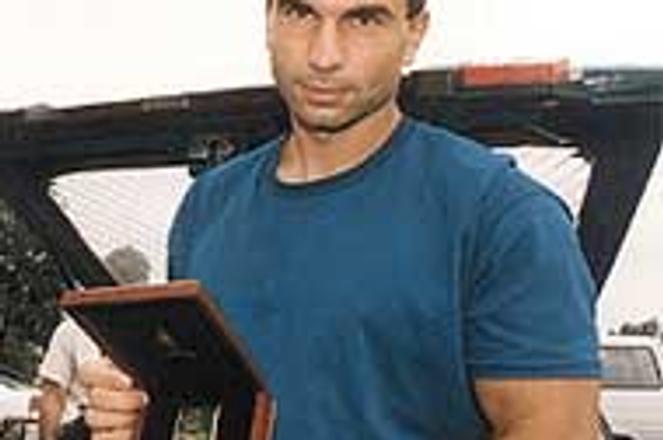Canoeist Kňazovický's coach says that his most formidable assets are his Herculean strength and his lack of respect for other competitors.photo: Spectator archives
Canoeist Slavomír Kňazovický is going to Sydney with a clear goal - to get another medal for Slovakia, and this time gold.
Having won the first ever silver medal in the history of independent Slovakia in the 1996 Atlanta Olympics in dramatic fashion, Kňazovický has made believers of his trainers, rivals and fellow Slovak Olympians.
"Slavo will do anything to reach his goal. When I learnt more about him back in 1994 while we were training in Mexico together, I realised that he is a kind of person who can have 100% concentration and doesnşt respect his rivals, and thatşs why he wins," said Pavel Blaho, Kňazovický's trainer and one of the coaches of the Slovak National Canoeing and Kayaking Team.
In Atlanta, the Slovak canoeist won the respect of his fellow competitors and the applause of fans when in a breath-taking 500 metres C1 (single canoe) race he propelled his canoe with a desperate last kick to cross the finish line, actually falling into the water, in snatching the silver medal.
Armed with what his trainer describes as his biggest competitive advantage - his Herculean physique - Kňazovický is at the head of a talented group of successful Slovak canoers and kayakers.
But unlike the majority of those who will be competing in Australia this September, Kňazovický only came to his sport relatively late in life. After recovering from an injury at secondary school that stopped him taking part in any sports for six months, he began training with some of his classmates who were involved in the sport and developed a passion for canoeing. At the age of 17 he joined one of the most successful canoeing clubs in Slovakia, Dukla Trenčín.
"I picked up this sport because I was looking for something which is not ordinary. Canoeing gives you a unique connection with the wilderness and it also involves other sports like football, hockey, swimming and skiing which canoers also have to practice in order to improve their physical abilities," Kňazovický says.
Kňazovický made his mark among the top world canoers in 1992, coming fourth in the C1 500 metres during the Barcelona Olympics. He has been ranked in the worldşs top five ever since. "It's a real satisfaction for me. I wanted to do well in Barcelona because I missed out on the Seoul Olympics [in 1988]. Barcelona was for me the start of success in my career."
But while Slovakia has a very recent tradition of canoeing and kayaking, the current success of the team [Michal Riszdorfer and Juraj Bača were the world double-kayak champions in 1998 in the 500 and 1000 metres events] is underlined by the fact that 22 out of 110 Slovak sportsmen who are going to Sydney are canoers and flat or white-water kayakers. Blessed with almost perfect conditions for the discipline - the Danube, Váh and Nitra rivers as well as reservoirs in central and western Slovakia offer unique conditions for training - Slovakia's success story with the sport has come on the back of hard work from the many clubs dotted around the country.
"These [geographical] areas are key for establishing sports clubs which then can develop successful canoers and kayakers from quite a young age," explains Blaho.
For him, three canoeing clubs, based in the south Slovak town of Komárno, the central Slovak city of Trenčín and the capital Bratislava, have done the most work in nurturing and developing new talents. "In these places, they have suitable natural conditions as well as good potential canoeists, which is part of the success," Blaho explains.
Added to the bright future of the sport in Slovakia, the split with its western federal neighbour seven years ago has added to the growing success of Slovak canoers and kayakers.
According to Blaho, Slovak canoeists have been more visible since 1993 when the Czechoslovak Federation split and the Czech and Slovak Republics were formed. "Canoeing, as well as kayaking, is one of the few sports [Slovaks practiced] which werenşt harmed by the split of Czechoslovakia into two independent countries," Blaho said. As trainer of the Czechoslovak national team, he adds, there were always problems with whether Slovaks or Czechs would go to the Olympics purely because of the enormous competition between sportsmen in the federation.
Although the volume of potential talent has been reduced with the split, Slovakia is still, Blaho says, blessed with potential. "The competition is still there but the potential is growing, which is very good," he says.
But while the 22 canoeists and kayakers will be heading off to Sydney at the end of the summer with justly high hopes, the scene at home, for all the praise garnered by Blaho and Kňazovický himself, is still dogged by money worries.
Top coaches, and more importantly the equipment and armies of experts that the athletics associations of richer countries can afford to employ to accompany trainers and teams to international events, is something Slovakia cannot compete with.
The expectations going into Sydney for the entire Slovak team, Kňazovický warns, are as high in other countries that are more than capable of matching Slovakia for not just talent, but coaches, trainers and much more.
"Canoers from Germany or Canada have teams of experts which consist of coaches and various therapists who do a considerable amount of work, something that would help Slovak sportsmen to achieve better results. It's hard to get qualified coaches and staff for the kind of money that is offered here."


